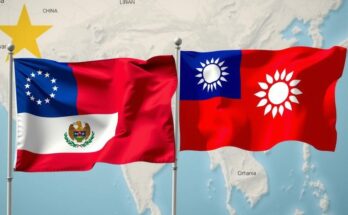The leaders of Eritrea, Egypt, and Somalia have convened in Asmara, forming a potential coalition against Ethiopia amidst longstanding tensions. The Eritrean statement highlighting sovereignty issues raises concerns regarding Ethiopia’s aspirations for port access. Somalia’s Minister has denied any intentions to incite conflict, emphasizing cooperation, while military exchanges between Egypt and Somalia showcase escalating ties. Historical dynamics between these nations complicate the unfolding situation, raising questions about future regional stability.
Recent discussions among the leaders of Eritrea, Egypt, and Somalia have solidified a coalition against Ethiopia, a nation with which they each maintain tense relations. This summit, held in Asmara, has raised eyebrows, particularly with an Eritrean statement emphasizing the importance of the sovereignty and territorial integrity of the regional nations. While Ethiopia was not directly named, the comment was widely interpreted as a critique of Ethiopia’s aspirations for access to maritime trade routes through a port. The new alignment has been fueled by a recent diplomatic fallout that has drawn Somalia closer to Egypt and Eritrea, both of which have longstanding conflicts with Ethiopia. There are growing concerns that this alliance could escalate into hostilities. According to Hassan Khannenje, director of the Horn International Institute for Strategic Studies, the formation of this coalition is indicative of a concerted effort to apply pressure on Ethiopia’s capital, Addis Ababa. He stated, “This is an axis against [Ethiopian capital] Addis Ababa. I think it’s an attempt to bring the hate together in trying to increase pressure against Addis Ababa.” Contrarily, Somalia’s Information Minister, Daud Aweis, refuted the notion of instigating aggression towards Ethiopia, asserting that the summit primarily aimed at fostering cooperation among the three nations. He declared, “We are not determined to instigate anything against Addis Ababa. Addis Ababa is our neighbour we have been co-operating together for a long time, although later on their leadership came up with a factor of instability in the region. But still we stand for peace and we don’t think that such a meeting in Asmara has anything to do with Ethiopia.” A photograph released post-meeting depicts President Isaias Afwerki of Eritrea shaking hands with Egyptian President Abdul Fattah al-Sisi and Somali President Hassan Sheikh Mohamud, accentuating their united front. The leaders expressed intentions to bolster Somali governmental institutions to tackle both internal and external challenges, particularly in their fight against terrorism. While Egypt’s President Sisi visited Asmara for the first time, President Mohamud has made three trips to the city within the year. This burgeoning alliance arises in the backdrop of Ethiopia’s continuing support for the Somali government in combating the militant group al-Shabab, despite Somalia’s discontent with Ethiopia’s recent agreement concerning Somaliland’s coastline, which is deemed a vital part of Somalia’s territorial claim. Additionally, tensions between Ethiopia and Egypt persist, rooted in disagreements over the Grand Ethiopian Renaissance Dam along the Nile River, which Egypt perceives as a potential threat to its water supply. In a demonstration of military cooperation, an Egyptian ship delivered military equipment to Somalia, following the arrival of arms by Egyptian planes. The peace accord signed by Ethiopia and Eritrea in 2018 seemed to herald a new era of diplomatic relations, but recent events have underscored the volatility still present in the region. Ethiopia’s endeavors to gain access to a Red Sea port have further strained ties with Eritrea, which previously allied with Ethiopia during the Tigray conflict. These dynamics suggest a complex nexus of alliances and rivalries in the Horn of Africa that could have significant implications for regional stability in the future.
The article discusses recent developments concerning the political dynamics in the Horn of Africa, where countries like Eritrea, Egypt, and Somalia are forming a collaborative front against Ethiopia. This situation is underscored by longstanding territorial disputes, water rights conflicts stemming from the Egyptian concerns over Ethiopia’s dam on the Nile, and the reactions to Ethiopia’s aspirations for sea access. Historically, these nations have fluctuated between cooperation and hostility, making their current alignment noteworthy amid ongoing regional tensions, including Somalia’s dissatisfaction with Ethiopia’s agreements regarding Somaliland.
In conclusion, the discussions among Eritrea, Egypt, and Somalia signal a strategic alignment aimed at countering Ethiopia’s regional influence amidst rising tensions. Despite conflicting perceptions regarding the purpose of their meeting, it has potential implications for future diplomatic relations and regional stability. As these countries navigate their historical grievances and current geopolitical interests, the prospect for cooperation or conflict remains uncertain, necessitating keen observation of developments in the Horn of Africa.
Original Source: www.capitalfm.co.ke




